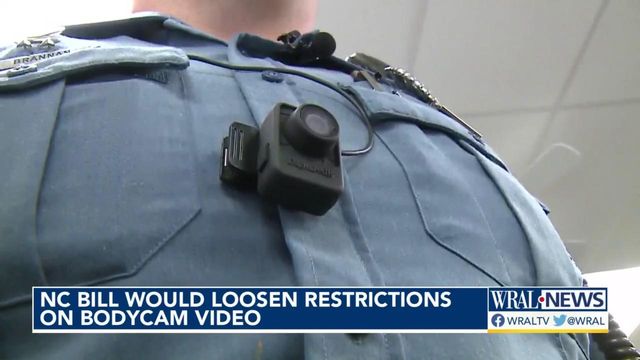Bipartisan deal moving to change NC police body camera law
Lawmakers also look to raise penalties for resisting arrest as part of a broad police reform bill.
Posted — UpdatedRight now, videos from officers' body-worn and dashboard cameras are secret unless someone convinces a judge to release them. A pending bill would essentially flip that process on its head for immediate relatives, allowing them access unless law enforcement convinces a judge not to release it or to allow material to be redacted.
The change would only affect family members. Media and other members of the public still wouldn't be entitled to the footage unless they get a judge to sign off.
The new language was added Monday afternoon to a broad police reform bill likely to pass the full state Senate this week. Lawmakers also added language to the bill to create two new charges for resisting arrest, both with harsher punishments than current law.
If an officer is injured in a scuffle or chasing someone who resists a lawful arrest, that person could be charged with a felony instead of the current misdemeanor. One new charge would be punishable by three months of community service. The second would call for 10 to 41 months in prison, depending on the severity of the officer's injury.
These measures and the body camera language were added to Senate Bill 300, the main vehicle for criminal justice reforms moving through the North Carolina Senate this legislative session. Several Democrats pushed back on the new resisting arrest language Monday, but other ideas in the bill have bipartisan support, and this is one of several pieces of legislation likely to pass on these subjects.
Measures carrying smaller pieces of Senate Bill 300 have either already passed the House or are pending there. House and Senate lawmakers, including Senate Bill 300 lead sponsor Sen. Danny Britt, R-Robeson, plan a press conference on the bills Tuesday morning.
Senate Bill 300 has dozens of other elements, too, including:
- A statewide duty for law enforcement to intervene and report to superiors any excessive use of force they witness
- Creation of a new database of law enforcement officer certifications, revocations and suspensions. Police departments and sheriff's offices would feed records into the database that other agencies would review before hiring an officer. The idea is to root out bad apples. The database would not be public.
- A new statewide database of "critical incidents" where someone dies or is seriously injured by law enforcement. The database would not be public.
- A new requirement to notify the state of Giglio or Brady letters, which are notices district attorneys send police departments when they don't believe an officer is trustworthy enough to testify in court. The letters, and the lists of them some district attorneys keep, aren't public record now and wouldn't be under the bill, but they would be cataloged at the state level.
- New required training on mental health and wellness strategies, and a required psychological screening before officers and deputies could be hired
- Creation of an "early warning" system to track accidents and critical incidents officers are involved in, as well as complaints filed against them
- Increased jurisdiction for the State Bureau of Investigation in cases where law enforcement kills or injures someone, and for all deaths in custody
- A new requirement for the courts to enroll defendants in a digital court date reminder system
- New rules requiring first appearances for people arrested on a misdemeanor and a reduction in the time it takes to schedule that first appearance, from 96 hours to 72 hours
Related Topics
• Credits
Copyright 2024 by Capitol Broadcasting Company. All rights reserved. This material may not be published, broadcast, rewritten or redistributed.






